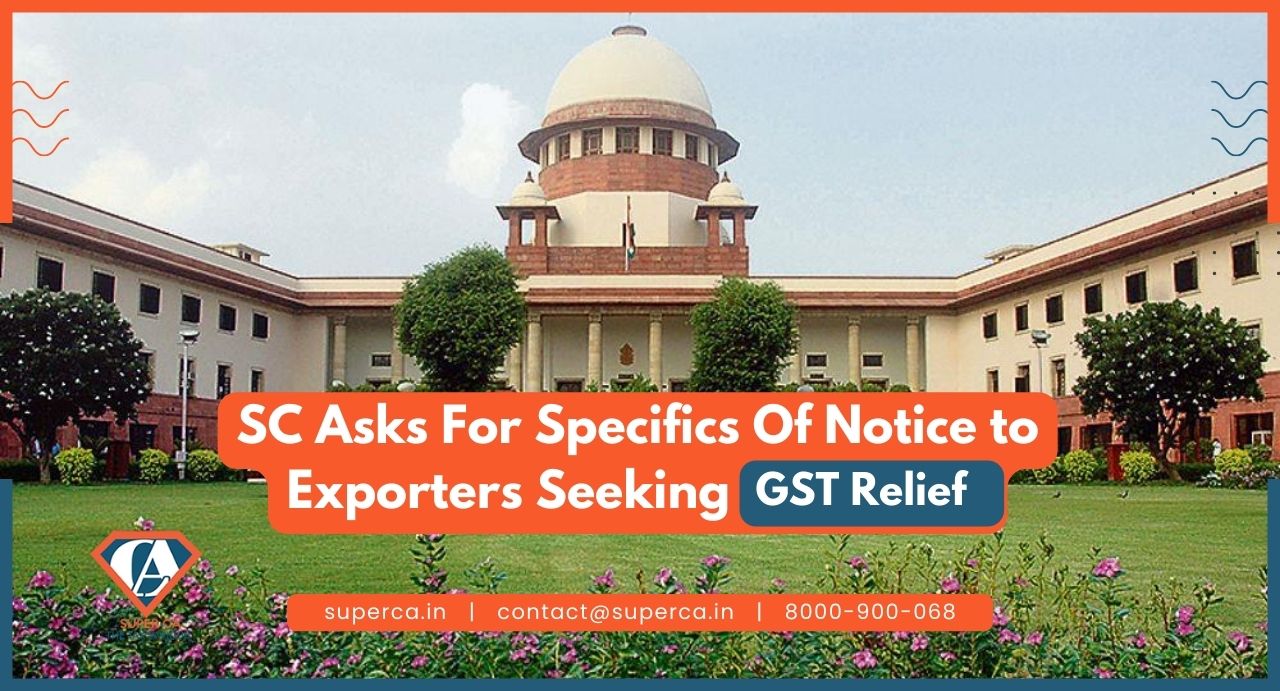SC Asks For Specifics Of Notice To Exporters Seeking GST Relief


Overview
On Tuesday, the Supreme Court requested information from the revenue department regarding the number of show-cause notices issued for GST exemption in instances where exports preceded imports and where high courts have granted interim orders. The court also reserved its decision on the central government's appeal against a Gujarat high court ruling in 2019 which deemed the "pre-import" condition as invalid in the advance authorization scheme of foreign trade policy. The government had filed a special leave petition challenging the high court's order and the Supreme Court has agreed to hear the revenue department's plea while also temporarily halting the high court's order. The revenue department believes that a pre-import condition requires imported materials to be used in the production of finished goods that must be exported, while exporters argue that this condition hinders the provision of working capital benefits.
In October 2017, the Foreign Trade Policy and Customs notification were amended to extend the benefit of Advance Authorization to exempt import of goods from levy of IGST, but with a "pre-import condition". This meant that an exporter must first import the goods, use them to manufacture export goods, and physically export those goods. This restriction eliminated the possibility of misuse of the scheme, but also made it difficult for exporters to avail the Advance Authorization on a "replenishment" basis, where exports are made first and then the corresponding benefit of exemption is applied to subsequent imports.
Additionally, the Advance Authorization scheme was only available for physical export, unlike the previous regime where it was also available for deemed exports. The GST Council has now removed the "pre-import condition" and extended the benefit to deemed exports, addressing these issues and making the Advance Authorization scheme more flexible for exporters.
The Goods and Services Tax (GST) turns five years old in 2022, and it is widely celebrated for simplifying business operations and easing the tax burden for consumers. The implementation of GST in India was a major step in indirect tax reform and marked a significant change in the country by merging a large number of taxes that were levied at both the central and state levels into a single tax. This reform had expected big advantages, as it replaced 17 local levies like excise duty, service tax, VAT and 13 cesses, on this day four years ago. As per the rules, all businesses and entities involved in buying and selling goods and services must register for GST if their turnover exceeds a certain threshold limit. It is mandatory to register for GST if the turnover exceeds Rs 40 lakhs for trading and manufacturing, or 20 lakhs for the service industry, or Rs 10 lakhs for special category states.
One of the most notable benefits of GST is the reduction of double taxation, the facility of input tax credit (ITC) claiming, and the reduction of filing requirements. GST is now fostering a common national market and making Indian goods more competitive in both international and domestic markets.
Suggested Read: E-Invoicing Under GST: Benefits and How to Implement It
The pre-import condition rule faced resistance from exporters, as they argued that it goes against the aim of providing working capital benefits to Indian exporters as stated in the advance authorisation scheme. The revenue department, on the other hand, believed that the pre-import condition requires imported materials to be used in the production of finished goods, which must be exported in order to fulfill export obligations. This, they argue, is only possible when exports occur after imports, allowing for sufficient time for the production of finished goods. As the law demands a pre-import condition for imported materials, it cannot simultaneously benefit from export anticipation. The revenue department also pointed out in the special leave petition that importers and exporters have been taking advantage of this provision without exception and that exported goods are often made from domestically procured materials or duty-free import goods that are used for purposes other than the manufacture of exported goods.

|
Essential LLP Registration Documents: A Complete Checklist for Entrepreneurs Author: Rahul Singh 04 Apr, 2024
|
Get inspired by these stories.